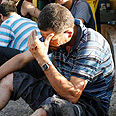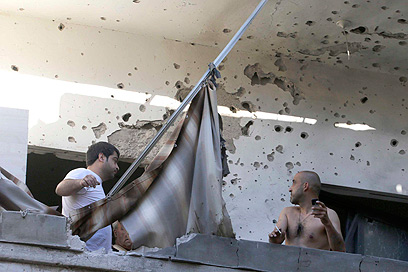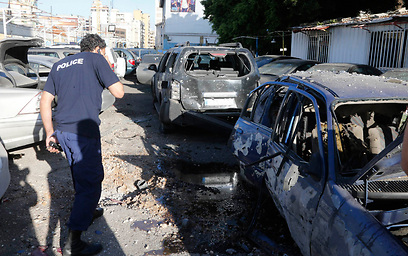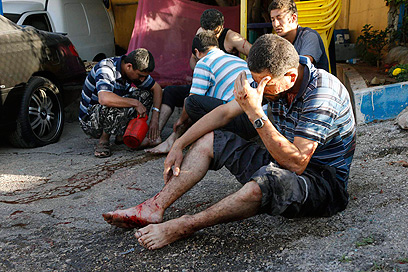
Syrian rebels: Rockets warning to Nasrallah
Following rocket hits to Hezbollah stronghold, Lebanese politicians attempt to calm violent winds, as Syrian rebels refuse to take responsibility, but insist rockets were warning to Lebanon, Hezbollah to halt involvement
The rocket fire was seen by many as additional proof of Syria-related tensions projecting into Lebanon, specifically in regards to Hezbollah's active support of Assad's forces. In the last couple of weeks, thousands of Hezbollah fighters have streamed into Syria to battle against rebel forces.
Related stories:
- 2 rockets hit Lebanese Hezbollah stronghold
- Nasrallah: We will bring victory to Assad
- Lebanon dragged in as Hezbollah joins Syria war
Lebanon, which was itself the scene of a bloody civil war that lasted for over 15 years (1975-1990), is like Syria a mosaic of religions and ethnicities, which include Sunni, Shiite and Alawite Muslims, in addition to Christians and Druze of different stripes.
In the last years, Lebanon has been witness to a number of violent outbreaks, first and foremost in the port city of Tripoli where there is a high concentration of Sunni and Alawite Muslims.
Recently, in the wake of news of Hezbollah fighters' bodies being returned to Lebanon from battles in Syria – an additional proof of Nasrallah's commitment to assist Assad's failing regime – battles have broken out throughout the city.
Since initial violence broke out last year, more than 130 people died in Lebanon and hundreds were injured in Syrian-related clashes.

Damage sustained to neighboring structures (Photo: Reuters)
Sunday's rocket fire seems to be a response from any number of Sunni groups to Nasrallah's announcement Saturday that Hezbollah, a Shiite group, will continue to stand by Assad and assist him in his battle against Sunni rebels which he believes to be conspiring with the US and Israel.
Lebanon's resigned prime minister, Najib Mikati, said Sunday that the real target of the rocket fire on Hezbollah stronghold was the group's military wing, which some hope will be disarmed. He called on all parties to act cautiously in wake of the current volatile situation in which certain forces are attempting to push Lebanon into a state of civil war.
Mikati pleaded with Leabon's current government to work to calm the tensions and cooperate in light of what he called "a sensitive period and a dangerous region."

Rocket's aftermath (Photo: Reuters)
Lebanon's President Michel Suleiman denounced the shooting, saying that those behind it were terrorists uninterested in peace or stability for either Lebanon or its citizens.
Suleiman called on State security apparatus to launch an intensive investigation of the incident and to apprehend the assailants behind it as soon as possible with the clear intent of bringing them to trial.
He further called on Lebanese citizens currently in the diasporas to stay alert and immediately report suspicious activity if and when they should witness it, in an attempt to nip any attempts to incite civil war in the bud.
Wounded in rocket attack (Photo: Reuters)
Even Syrian rebel forces, seen by some as the main suspects behind the rocket launches, commented on the events in Lebanon – without directly taking, or denying, responsibility.
The director general of the Free Syrian Army, the largest and most organized of rebel organizations, said that the rockets could be read as warning to Hezbollah.
According to him, if the Lebanese government fails to stop the group's cross-border activities, then their actions might have ramifications for Beirut, Tripoli and the country's main airport, which according to him has become a central axis for Iranian planes transferring arms to Assad.
One of the Free Syrian Army's spokespersons was quick to publish a denial of involvement in the incident in Lebanon, saying that the Syrian rebels had no connection to the rocket fire. He called the director general's comments "irresponsible."
Bahrain: Nasrallah 'terrorist'
At around noon Sunday, Bahrain's foreign minister, Khalid bin Ahmed Al Khalifa, made an unusual announcement for an Arab leader, claiming Nasrallah was a terrorist and warning that Hezbollah fighters could turn the tide in Assad's favor.
His comments were a clear deviation from the traditional line of Arab politics, which viewed Hezbollah as the central force in the battle against Israel. Thus his comments testify to the growing sectarian division being expanded and accentuated through and because of the Syrian conflict.
Bahrain, a Gulf state monarchy ruled by a Sunni royal house, has itself faced internal sectarian tensions, with thousands of Shiites, which are a solid majority of the country's population, taking to the streets in 2011 calling for political reforms and democratization that would allow them some semblance of political involvement and representation.
At the time, Bahrain leaders blamed their neighbor, the largest Shiite country in the world – Iran – and Hezbollah – a Shiite terrorist organization funded by Iran – for igniting the popular uprising in the Gulf state.
According to the official Bahrain news agency, "Foreign Minster Sheik Khalid bin Ahmed Al Khalifa said that Hezbollah Secretary General Hassan Nasrallah was a terrorist, declaring war against his own people," the agency said, quoting the minister's twitter account.
It further reported that the minister said that "halting Nasrallah and rescuing Lebanon from his grips was a national and religious duty."
In a speech given Saturday by Nasrallah, commemorating 13 years to the Israeli withdrawal from southern Lebanon, Nasrallah said that Syria was faced with the threat of radical Sunni Islamist who were in cahoots with the US and its allies in an attempt to promote Israel's interests in the region.
After the Israeli withdrawal and the Second Lebanon War, Nasrallah became somewhat of a hero in the eyes of the Arab world; however, his unapologetic backing of Assad and the Alawite minority from which he stems – and which rules Syria's Sunni majority – has turned many former supporters into staunch critics.
- Receive Ynetnews updates directly to your desktop












